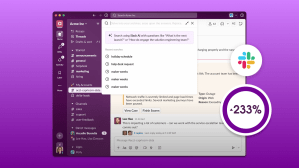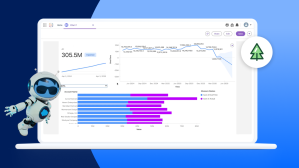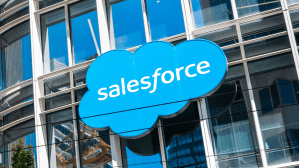AI Energy Score establishes a clear and trusted benchmark for the energy efficiency of AI models
As part of the initiative, public ratings for 166 commonly-used AI models are being released to help developers and AI users identify models that use less energy
Salesforce, in collaboration with Hugging Face, Cohere, and Carnegie Mellon University, today announced the release of the AI Energy Score, a first-of-its-kind benchmarking tool that enables AI developers and users to evaluate, identify, and compare the energy consumption of AI models.
Salesforce also announced it will be the first AI model developer to disclose the energy efficiency data of its proprietary models under the new framework.
Why it matters: The AI Energy Score aims to address the lack of transparency about the environmental impact of AI models. Similar to how ENERGY STAR transformed energy efficiency standards for appliances and electronics, this initiative establishes a clear, trusted benchmark for AI model sustainability.
Go deeper: The AI Energy Score will debut at the AI Action Summit, where leaders from over 100 countries, the private sector, and civil society will convene to harness AI for good. By enhancing transparency, the score can drive market preference for efficient models and incentivize sustainable AI development. Recognized by the French Government and the Paris Peace Forum for its transformative potential, the AI Energy Score features:
- Standardized Energy Ratings: A standardized framework for measuring and comparing AI model energy efficiency.
- Public Leaderboard: A comprehensive leaderboard that features scores for 10 common AI tasks — such as text generation, image generation, and summarization — performed by 166 models, including Salesforce’s SFR-Embedding, xLAM, and SF-TextBase.
- Benchmarking Portal: A platform where AI developers can submit their open or proprietary AI models to be evaluated and added to the leaderboard. Open models can be automatically tested, while closed models can be evaluated through a secured testing sandbox.
- Recognizable Energy Use Label: A new 1- to 5-star label that rates AI model energy use, with five stars indicating the highest efficiency. This helps developers and users easily identify and choose more sustainable models. Once rated, AI developers can generate standardized labels to share their models’ energy score, with built-in guidance on the proper label display for visibility and impact.

Agentforce is built with sustainability at its core, delivering high performance while minimizing environmental impact.
How Salesforce addresses sustainability through Agentforce: Last fall, the company introduced Agentforce, the agentic layer of the Salesforce Platform for deploying autonomous AI agents across any business function. Agentforce offers tools to build and customize agents, as well as a library of ready-to-use skills for sales, service, marketing, commerce, Tableau, Slack, and more.
- Agentforce is built with sustainability at its core, delivering high performance while minimizing environmental impact. Unlike DIY AI approaches that require energy-intensive model training for each customer, Agentforce is optimized out-of-the-box, eliminating the need for costly, or carbon-heavy training.
- Its agentic architecture goes beyond reliance on a single large language model (LLM), instead leveraging efficient small language models combined with agentic reasoning and other advanced AI tools, significantly reducing energy consumption.
- For example, Salesforce’s SFR-RAG is a small language model optimized for accurate, reliable tasks. It cites sources, extracts precise facts, and handles complex questions, delivering trustworthy answers with greater efficiency and lower energy use.
- Additionally, Agentforce leverages tailored data and metadata from Salesforce Data Cloud and the Salesforce Platform, enabling high accuracy and responsiveness while minimizing wasted computational resources.
Soundbites:
- “The AI Energy Score exemplifies the missions of the AI Action Summit by tackling a pressing societal issue — AI transparency and sustainability — through bold innovation and global collaboration. We are proud to showcase this groundbreaking initiative at the Summit, as it stands as a powerful testament to the ingenuity of the global academic and industry ecosystem and a rallying call for collective action towards responsible AI development.” – Bruno Bonnell, General Secretary for Investment, France
- “Transparency like that offered by the AI Energy Score is crucial. Over the past three years, we’ve collaborated to refine and obtain more granular elements for the key indicators like CPU and RAM data. This initiative sets an important milestone, and we hope more proprietary model providers join us in adopting such practices to drive accountability and sustainability across industries and supply chains. By openly sharing energy consumption data, our companies can collectively implement ecodesign practices and minimize the environmental footprint of AI technologies.” – Ariane Thomas, Global Tech Director of Sustainability, L’OREAL Group
- “The AI Energy Score represents a major milestone for sustainable AI. By creating a transparent rating system, we address a key blocker for reducing the environmental impact of AI. We’re thrilled to launch this project and look forward to seeing wider adoption.” – Dr. Sasha Luccioni, AI & Climate Lead, Hugging Face
- “Reducing AI energy consumption lowers operational costs, optimizes infrastructure, and enhances long-term sustainability and profitability. We are proud to work with industry leaders to build a more transparent AI ecosystem.” – Suzanne DiBianca, EVP and Chief Impact Officer, Salesforce
We are proud to work with industry leaders to build a more transparent AI ecosystem.
Suzanne DiBianca, EVP and Chief Impact Officer, Salesforce
Learn more:
- Dive into the AI Energy Score Documentation & FAQ
- Read more about the AI Energy Score in Nature
- Read the latest news on Agentforce
- Learn more about the Salesforce Accelerator – Agents for Impact
- This is how Salesforce is balancing AI with sustainability















